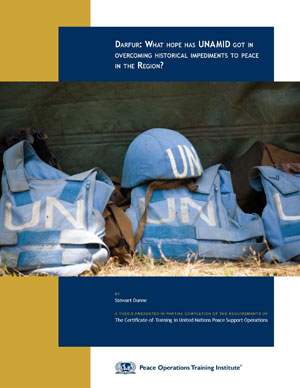Darfur: What hope has UNAMID got in overcoming historical impediments to peace in the Region?
Tesis de COTISPO: Aprobado
Estudiante: Dunne, Stewart
Fecha de Aprobación: May 2009
Un extracto de la tesis:
When investigating the background to the crisis in Darfur there is the immediate indication that the region has seen persistent violence and conflict in its history. This is emphasized in the titles of many written works on the subject, which highlight the endemic suffering, destruction and dislocation that has been witnessed by peoples of the region. The crisis in Darfur has again featured heavily in the media of late, almost giving the impression that the conflict is a recent event. Sudan and the Darfur region have long been subjected to conflict and war, particularly since independence from British-Egyptian rule on 1 January 1956. The events that have garnered international attention most recently, have not abated despite the auspices of the international community - the United Nations, the African Union, Non-Government organisations and the like – to mediate an end to the crisis.1 This paper will examine the origins of the crisis in Darfur, rooted in history and influenced by modern pressures and explore the consequences of these influences on the likelihood of a successful mission by UNAMID. The role and contribution of AMIS as a precursor to the hybrid operation will also be considered.
